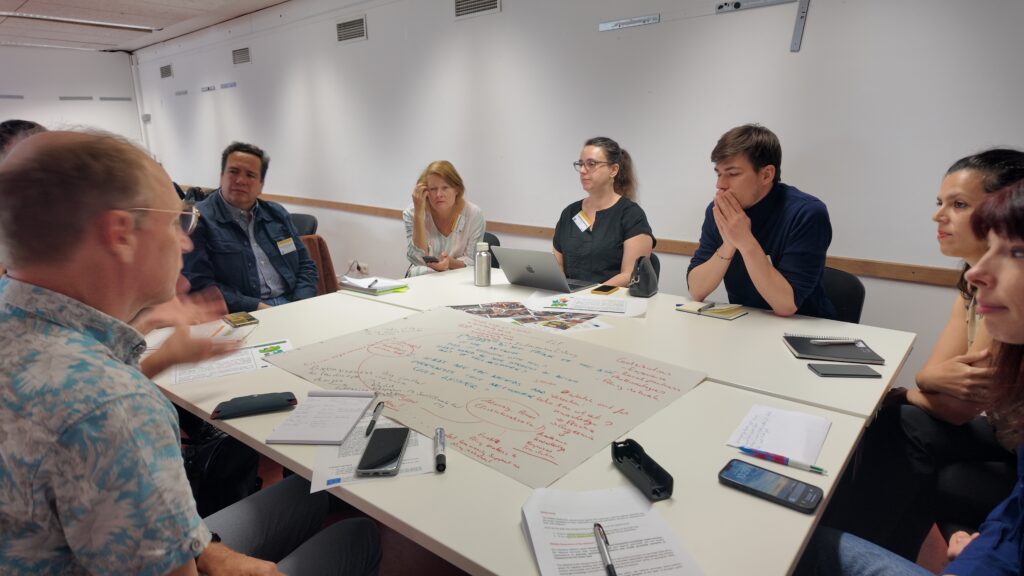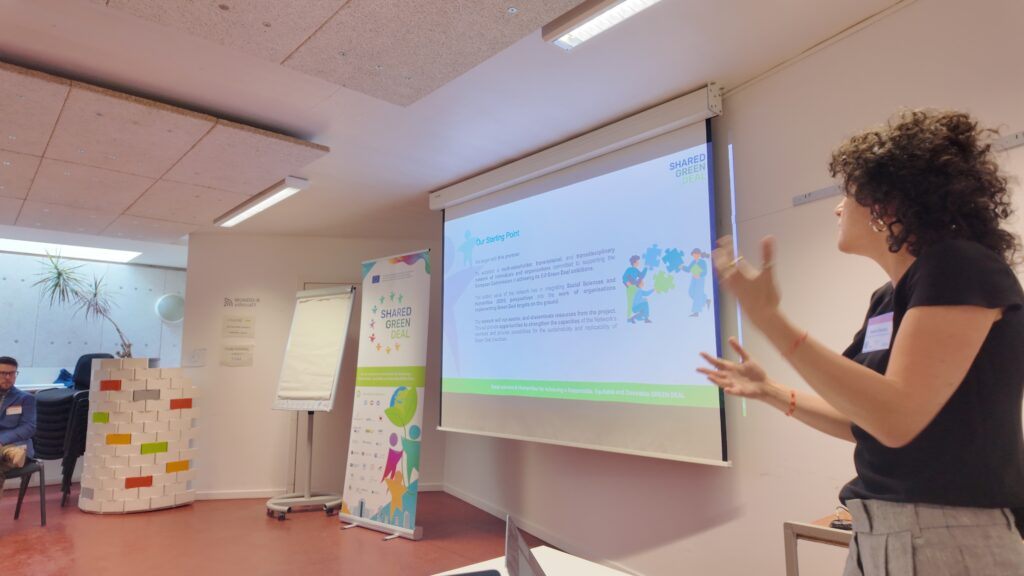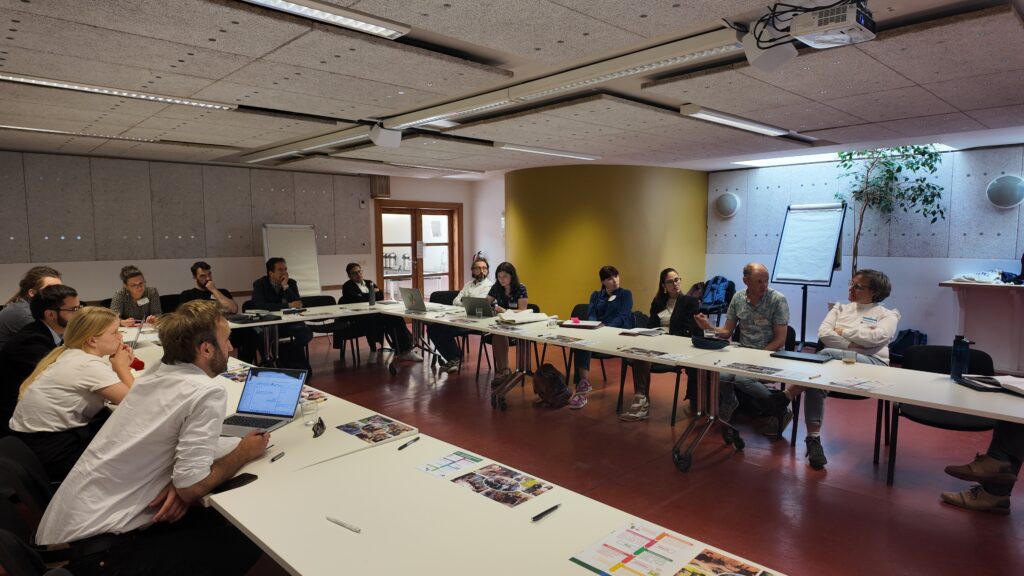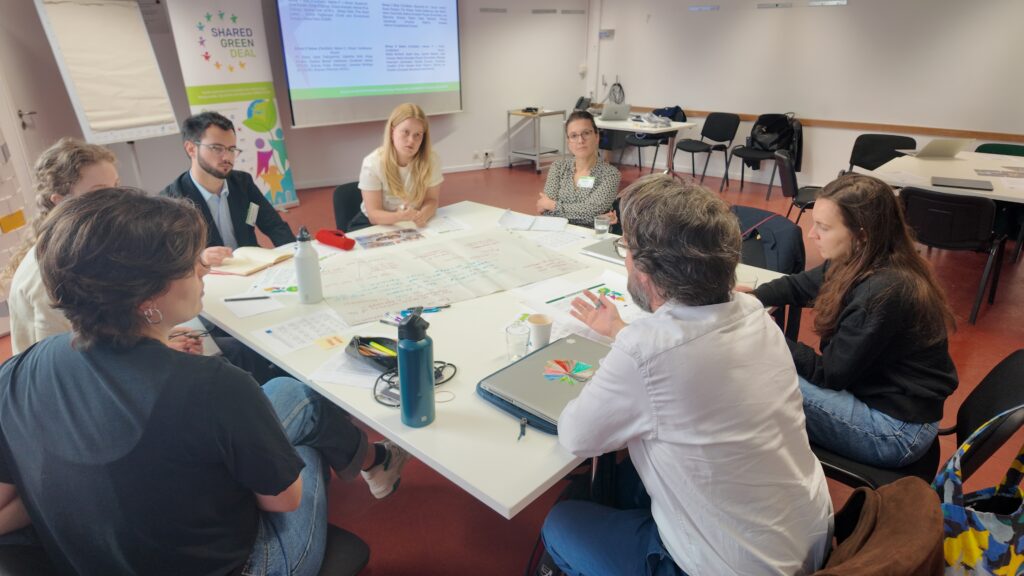Reflections after moderating the panel “United Communities and Regions: Effective Governance for Ukraine’s Recovery” at the Ukraine Recovery Conference 2025 in Rome, Italy.
Antonella Valmorbida, Secretary General of ALDA, European Association for Local Democracy – moderated the panel on local and regional governance in Ukraine at the Ukraine Recovery Conference held in Rome on 10–11 July 2025.
What follows is a first-hand account of this experience, shared in her own words. Mrs. Valmorbida played an important role not only during the Conference itself, but also throughout the preparatory process leading up to this crucial moment of URC 2025.
ALDA stands in firm support of Ukraine in its fight against Russian aggression and in defence of its territorial integrity. Since 2012, ALDA has been actively engaged in strengthening local democracy and has consistently supported the European aspirations of the country and its citizens.
“At URC 2025 in Rome, I had the privilege of moderating a panel on local and regional governance in Ukraine.
I began the session with a brief but impactful statement that drew immediate attention to the heart of the matter:
“Ukraine’s recovery cannot succeed without solid democratic and accountable governance at all levels. And what we have seen, even during the most dramatic moments of the war, is that Ukrainian communities, mayors, and local leaders have not only endured—but led.”
This was not an abstract debate. It was a conversation about real people, under real pressure, making critical decisions every day. What became clear throughout the session is that local self-government has become the very core of Ukraine’s resilience and recovery. It is at the local level that rebuilding has already begun—through underground hospitals, energy protection systems, intermunicipal cooperation, and safe shelters for learning. These are not theories; these are daily realities.
The panel brought together a powerful and diverse mix of voices: mayors, regional leaders, MPs, international partners, reform experts, and EU officials. But most importantly, it brought together authentic voices—those who live and shape these realities on the ground.
I would like to share a few highlights and quotes that reflect the urgency, clarity, and spirit that shaped the discussion.
In a heartfelt address, Oleksii Riabykin, Ukrainian Deputy Minister for Development of Communities and Territories, highlighted the extraordinary challenges Ukraine has been facing due to Russia’s full-scale war, emphasising that no part of the country is truly safe from missile and drone attacks. Despite this, 99% of local self-governments remained active, playing a crucial role in defending their communities and upholding democratic values.
Mr Riabykin stressed the importance of establishing a legal framework to monitor local government decisions, ensuring a clear division of powers, and maintaining a constructive dialogue between local and national authorities—even in the face of daily challenges.
“Ukraine continues the reform and the recovery. Why? Because we have no other choice. Reform and recovery is about people. The reform continues every moment. The local self-government and the central authorities need to be able to respond to these challenges and changes and if it were not for the internal unity, we would not be able to respond to these challenges.”
He concluded by expressing deep gratitude to Ukrainian institutions and international partners—referred to as “friends”—for their unwavering support in helping Ukraine grow, defend itself, and pursue democratic reform.
Oleksandr Prokudin, Head of Kherson Regional Administration, described frontline realities of an area who has become a symbol of both destruction and resilience:
“Since August 2024, drone attacks have increased. We faced around 3,000 drone strikes weekly. But life in Kherson never stopped. We didn’t give up. We didn’t leave. We adapted, resisted, and learned.”
Indeed, despite all horrors, life in Kherson never stopped. Residents stayed, adapted, resisted, and innovated. Mr Prokudin shared how these hard-earned lessons have been transformed into a programme called “Civil-Military Administration in Conditions of Modern War”—a practical, experience-based guide for surviving and functioning under constant attack. The programme addresses:
- Drone defence, including a three-level electronic wall operating across 15 frequencies and drones that intercept others mid-air.
- Medical care under bombardment, with underground hospitals already functioning and more underway.
- Education, with children learning in shelters and plans to reopen more schools under protection.
- Energy resilience, with critical infrastructure shielded by physical defences, electronic warfare, and backup power systems.
The speaker warned that if war reaches other parts of Europe, unprepared regions will face catastrophic consequences. Kherson’s experience, developed through devastating losses, can now serve others.
In closing, he made a powerful appeal: to give meaning to Kherson’s suffering by transforming pain into preparedness—and to “build a Europe where no regions would learn these lessons the hard way”.
Vitalii Bezghin, Chairman of the Committee on State Building, Verkhovna Rada, connected the current challenges to the bigger picture: he thanked European partners, and particularly Italian ones, for their continued support, emphasising that Ukraine is defending not only itself but all of Europe from Russian autocracy.
Then, he reflected on Ukraine’s unique experience: more than 11 years of war and decentralisation reform, 5 years of a new territorial structure, and 3 years of full-scale invasion. Despite this, Ukrainian municipalities and regional administrations have developed a “symbiotic” model, balancing decentralised governance with state administration—a structure that has helped maintain stability during the war.
“We got this symbiotic system of decentralised municipalities and communities, but in a parallel way we got our state administrations”.
He also highlighted three key pillars of decentralisation going forward: resources, influence, and above all, responsibility—particularly in terms of transparency and accountability to citizens.
Finally, Mr Bezghin mentioned Ukraine’s 2019 territorial reform as a unique achievement: consolidating over 11,000 local units into 1,470 strong municipalities. These communities now serve not only as the backbone of Ukraine’s resilience but also as Europe’s frontline of defence. “Ukraine – he concluded – is not only in need of support but is also ready to share its hard-earned knowledge with Europe.”
Stefano Lo Russo, Mayor of Turin (Italy), speaking also on behalf of fellow Italian mayors from cities like Bergamo, Bari, and Verona, drew a parallel between the challenges faced by Ukraine and those experienced in Italy — emphasising the importance of turning tragedy into an opportunity for renewal and growth.
Highlighting Italy’s long-standing tradition of strong municipalities, the mayor stressed the centrality of local authorities in both institutional governance and public service delivery.
“Municipalities are crucial not only in administrative processes but also at the institutional level. Hence, I believe that within a framework of European legal settings, subsidiarity is a central topic, and I believe that helping Ukraine with a reform of the asset is a fundamental step towards creating a new model with a split between centralised and decentralised power.”
He proposed Italy’s model—not as the only one, but as a useful reference—for Ukraine’s decentralisation reform, advocating for a clear division of responsibilities between central and local powers. Finally, he concluded by affirming the importance of subsidiarity and the use of EU funds at the local level, urging that local autonomy be recognised as a cornerstone of Ukraine’s future European integration.
Mathieu Mori, Secretary General of the Congress of Local and Regional Authorities of the Council of Europe, reaffirmed the organisation’s longstanding commitment to supporting Ukraine’s democratic resilience—especially at the local and regional level.
“Ukraine has been a member of the Council of Europe for 30 years. So we’ve worked together at increasing democratic security of Ukraine which involves of course also increasing decentralisation and good governance.”
While recalling the Congress’s involvement in 2014 during the first wave of decentralisation reform, he highlighted today’s scenario where the Congress works closely with Ukrainian stakeholders—including the Parliament, government, and local authority associations — to revise and update the 2014 decentralisation framework.
In response to questions on governance structure, Mori outlined three major areas of focus:
- Transition from military to civilian administration in de-occupied territories.
- Clear division of competences between national and local governments.
- Strengthening inter-municipal cooperation, civic engagement, transparency, and accountability.
He concluded by underlining that what may seem like “technical” reforms are, in fact, crucial for Ukraine’s democratic renewal. The Congress remains a committed, long-term partner, ready to support Ukraine every step of the way.
Sergii Mazur, Mayor of Balta in the Odesa region, emphasised the economic perspective of local recovery. Despite the war and daily threats, the mayor stressed that Ukraine remains a place of opportunity. Investing in Ukraine, especially in smaller municipalities, offers clear returns, helps people remain in their communities, and supports local economic development. He shared examples of successful cooperation with Ukraine’s Ministry of Communities and Territories, which enabled his city to carry out quick, high-impact projects like hospitals and schools—often despite legislative uncertainty.
He highlighted the importance of international partnerships, mentioning Germany’s goal to reach 1,000 municipal partnerships with Ukrainian cities by the end of the year. He warmly thanked Italy for its support and extended a call for twinning cooperation, expressing Balta’s openness to forming a partnership with an Italian municipality.
“Thanks to our partners, we have been able to implement various social projects during the full-scale invasion and those projects were implemented in the times that were most difficult for Ukraine.”
The speech closed with a powerful reminder: Ukraine is not only defending itself but also protecting Europe’s shared values, and the mayor called on European partners to invest in Ukraine—not just as donors, but as reliable allies in rebuilding and integration.
Haoliang Xu, UNDP Acting Administrator, outlined the organisation’s strategic priorities for supporting local and regional governance in Ukraine, emphasising that national development goals cannot be achieved without local action.
UNDP’s approach focuses on aligning local initiatives with national objectives through long-term, systems-based recovery strategies that empower actors at all levels—from central government to civil society and local communities.
In particular, he stressed four central priorities, being Reconstruction, Returns, Resilience and Reforms.
To support these, UNDP applies a local area-based programming tool that integrates planning, financing, and governance while advancing priorities such as infrastructure recovery, economic revitalisation, climate action, gender equality, and community resilience.
“We are trying to really promote this system-based and the long-term recovery approach that empowers all actors, all stakeholders from the central government to local authorities, civil society, private sector and citizen groups.”
The representative concluded by reaffirming UNDP’s commitment to connecting national plans with local implementation and delivering integrated support for Ukraine’s recovery—rooted in transparency, accountability, and community engagement.
Stefan Schleuning, Head of Cooperation at the EU Delegation to Ukraine, opened by recalling the evolution of the Ukraine Recovery Conference — from its initial focus on reforms to its current emphasis on recovery, while underscoring that Ukraine has impressively continued its reform agenda even amid full-scale war.
He then reminded us of the strategic role of decentralisation:
“Decentralisation is often referred to as the most important and successful reform since the Revolution of Dignity in 2014. I think we have seen a very deep transformation of local governments.”
He then concluded by recalling two key initiatives in the support to Ukraine, such as U-LEAD with Europe and EU4Recovery which were also highlighted as vital to Ukraine’s resilience and European path.
Finally, Alla Basalaieva, Head of the State Audit Service of Ukraine, outlined the country’s decentralised system of control for overseeing recovery-related projects.
With regional audit offices across Ukraine, the service conducts both audits and inspections aimed not only at detecting violations but also at evaluating the effectiveness of administrative decisions.
“The main task (of audits) is not in fact to find or reveal violations but just to see how effective the administrative decisions are.”
She then highlighted the service’s additional role as Ukraine’s Anti-Fraud Coordination Service, working in close collaboration with OLAF to strengthen donor confidence and provide a subnational level of oversight.
In this perspective, three key structural challenges were identified:
- Lack of transparent criteria for selecting reconstruction projects, leading to non-transparent allocation of funds.
- Poor quality project documentation and inflated construction costs.
- Absence of a legally regulated framework for estimating reconstruction costs.
Mrs. Basalaieva praised the cooperation with the Ministry for Reconstruction and noted that many audit recommendations lead to legislative initiatives. She concluded by announcing a new cooperation agreement with the European Investment Bank, reinforcing the Audit Service’s role in ensuring transparency and accountability in Ukraine’s recovery.
These are just some hints that emerged from the conversation, spoken with steady, resilient voices, eyes filled with hope, and deep emotion for all that is happening in Ukraine.
Listening to these speakers, I was reminded of a simple yet powerful truth: democracy and resilience begin in municipalities. And that is exactly where ALDA stands.
For many years, well before the full-scale invasion of 2022, ALDA has worked hand-in-hand with local communities in Ukraine. And throughout the war, we have continued and expanded that commitment.
When I speak about ALDA, I picture our partners, the Local Democracy Agencies (LDAs). They are not offices. They are living, breathing local movements. They support and help displaced people, empower youth to engage in decision-making processes, promote transparent governance, and bring people together during crises.
We have helped establish LDAs in Dnipropetrosk region, Mariupol, Odesa, Vinnytsia, Ovrutch and, most recently, in Kharkiv in 2024. Beyond these, we are actively supporting more than 30 Ukrainian members through dozens of very concrete community projects, together with over 50 European partners. ALDA is a membership based and membership-led organisation, and we bring Ukraine to Europe and Europe to Ukraine.
In Dnipropetrovsk Region, ALDA worked with LDA Dnipro on a project aimed at renovating four premises in the Sokil residential complex to provide temporary shelter for 6–8 internally displaced persons (IDPs). More than just housing, this initiative offered a safe and dignified space for people who had fled the violence, giving them not only a roof over their heads but a sense of belonging. Set within a condominium, the shelter functions as a small, supportive micro-community—fostering social cohesion, mutual care, and shared responsibility. At the same time, it actively promotes good governance and participatory democracy at the local level, showing how solidarity and local action can rebuild lives even in the shadow of conflict.
The Local Democracy Agency of Mariupol, now relocated to Kyiv, continues its activities also back to back with the vital work through the “I-Mariupol” initiative: offering psychological support, organising community events, and assisting survivors of occupation. A special support from ALDA today goes to Mariupol’s municipal team to develop social affordable housing in Ukraine.
In October 2024, the “Garden of Dreams” camp was launched in Bohuslav (Kyiv region) to support children aged 10–16 from internally displaced families from Mariupol. Organised by the LDA Mariupol with support from several partners including ALDA, the initiative offered creative workshops, excursions, and physical activities to foster psychological resilience, creativity, and social connection. The camp provided a safe and inspiring space where children could process trauma, rebuild confidence, and regain hope for a brighter future.
In the Vinnytsia region, we provided rehabilitation support to one hospital and to refugee centers. We also built partnerships with French and Spanish actors who share our belief in Ukraine’s independence and European future. These European partnerships already gave successes; fostering cooperation with universities, economic actors, and the social sector.
In Kharkiv, we are working with French and Italian municipalities and regions to improve support to this difficult border region.
These are just a few examples, and they may sound like small stories. They don’t always make the headlines. But this is precisely what true resilience looks like.
At ALDA, we believe in reinforcing what is already working: creating spaces where communities can speak, listen, and – ultimately – act together.
We have experience. We have committed partners. And now, our task is to ensure these stories don’t remain confined to the halls of URC. They must become the blueprint for rebuilding a more democratic and resilient Europe.
After this long journey shared with the organisers of the URC 2025, in both Rome and Kyiv, we express our deepest thanks. We have to thank them for valorising the efforts of local and regional governments and for enabling us to work more closely together in shaping Ukraine’s future.




